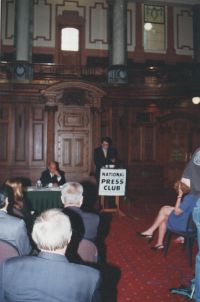New Party will shake up self-serving Members of Parliament
Like a South Seas version of Donald Trump New Zealand economist–philanthropist and family man Gareth Morgan has launched himself into the firmament of Oceania politics astride his own freshly minted political party and has done so with the same purpose which is to introduce a new order to replace the current one in which he sees Members of Parliament primarily fixated on becoming MPs. Then remaining MPs.
Mr Morgan proclaims that he intends to “light a fuse” under the existing order and thus break the stranglehold that he claims “career” politicians have on the nation of under five million people.
Igniting his “fuse,” in the form of his Opportunities Party on the eve of Guy Fawkes, he does not object to being compared to Donald Trump in terms of Trump’s determination to smash the status quo.
The Opportunities Party will start issuing segments of its manifesto soon.
Mr Morgan’s decision to launch his own political vehicle comes as no surprise. The Welsh-born economist was a household business name before his family began and then spectacularly sold its version of Ebay.
The family’s TradeMe online site which replaced newspaper classified advertising was sold to the Australian-based Fairfax media chain for $700,000,000. This was approximately the same amount that News Corporation paid at the same time for Myspace which was at the same time one of the world’s busiest social networking sites. When additional management contracts were taken into account the sum is considered to have been in the region of NZD1 billion.
The problem for the new acquirer, Fairfax, was that TradeMe which retained its saturation in New Zealand had mixed results in market penetration internationally, notably in Australia.
In addition to his family’s wealth, Mr Morgan fills the other side of the equation for being admired in New Zealand which is that he is a sportsman being, with his wife, a big capacity motorbike traveler across the world’s most demanding terrains.
It is unlikely that Mr Morgan will have any problems in acquiring the 500 members required in New Zealand for his new party to obtain official recognition.
Mr Morgan is likely to enjoy from the wider voter spectrum approval for lighting the blue touchpaper under the seats of “career” politicians, an unknown species in New Zealand until the 1980s.
Until that time Members of Parliament were drawn from those who had served as farmers, businessmen or commercial lawyers (National Party) or trade unionists, educationalists or advocacy lawyers (Labour Party.)
From the 1980s onward the trend became defined for candidates to start aiming for election at an early age and to bring with them, if successful, no previously acquired practical or applied experience beyond that of campaigning and boondoggling to become an MP.
It remains uncertain if Mr Morgan will offer himself as a candidate for his new party. A problem for him will remain that in spite of proportional representation being well installed in New Zealand, it has not propagated the same diversity of splinter parties which it has done, for example in Latin nations where it has long been standard.
The two monolithic parties continue to dominate. Though with a degree of permutation and combination with smaller parties, notably Greens and Maori, and the Winston Peters New Zealand First.
However, Mr Morgan’s move will act to crystallise disquiet about the general numbers, terms and conditions, especially those relating to emoluments of New Zealand’s sitting MPs. There are 120 of them, and they are rather better paid than their 650 counterparts in Westminster.
He will tap too into electorate disquiet about the ease with which their pay increases enjoy easy legislative passage at a time when everyone else is being urged to tighten their belts. Similarly with the seemingly infinite career duration of certain members along with the perennial matter of MPs long-tail entitlements.

















